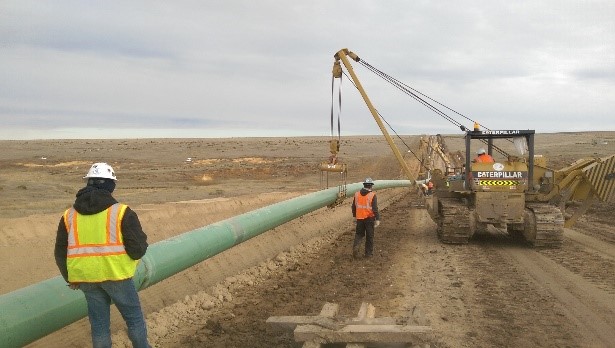Credited Pipeline Construction Safety Training (PCST)

Prioritizing Safety: The Imperative for Oil and Gas Companies to Enforce Credited Pipeline Construction Safety Training (PCST):
The oil and gas industry is known for its dynamic and often hazardous working environments. Safety is of paramount importance in this sector, particularly in the construction of pipelines. To mitigate risks and ensure the well-being of workers and the surrounding environment, oil and gas companies must enforce credited Pipeline Construction Safety Training (PCST) courses. In this article, we will explore the reasons why it is imperative for oil and gas companies to require their workers to undertake PCST and the benefits this training brings to the industry.
The Significance of Pipeline Construction Safety Training (PCST)
- Complexity of Pipeline Construction:
- Pipeline construction involves a multitude of processes, including excavation, welding, and handling of hazardous materials.
- PCST equips workers with the knowledge and skills to navigate the intricacies of construction while adhering to safety protocols.
- Safety Regulations and Compliance:
- Regulatory bodies, such as the Occupational Safety and Health Administration (OSHA) in the United States and provincial authorities in Canada, have stringent safety requirements for pipeline construction.
- PCST ensures that workers understand and comply with these regulations, reducing the risk of legal repercussions for non-compliance.
- Protection of Workers:
- The health and safety of workers are paramount. PCST teaches workers to identify and respond to potential hazards, ensuring their well-being throughout the construction process.
- Proper training reduces the likelihood of accidents and injuries, which can be life-threatening in the pipeline construction industry.
- Environmental Stewardship:
- Oil and gas companies have a responsibility to protect the environment during pipeline construction.
- PCST includes modules on environmental awareness, teaching workers how to prevent spills, minimize environmental impact, and respond to emergencies appropriately.
- Public Safety:
- Pipelines often traverse populated areas, making public safety a critical concern.
- Workers trained in PCST are better equipped to ensure the safety of both workers and nearby communities during construction.
- Risk Mitigation:
- Accidents and incidents during pipeline construction can result in substantial financial losses for companies.
- PCST is a proactive approach to risk mitigation, reducing the likelihood of costly accidents, delays, and damage to equipment and infrastructure.
Reasons for Enforcing Credited PCST
- Consistent and Standardized Training:
- Credited PCST programs adhere to established industry standards and best practices.
- Enforcing credited PCST ensures that all workers receive consistent and standardized training, eliminating potential gaps in knowledge.
- Legal and Regulatory Compliance:
- Many regulatory authorities require accredited safety training for workers in the oil and gas sector.
- Enforcing credited PCST ensures compliance with these regulations, preventing fines and penalties for non-compliance.
- Quality Assurance:
- Accredited PCST programs are subject to rigorous evaluation and scrutiny to maintain their accreditation status.
- Enforcing credited PCST assures oil and gas companies of the quality and effectiveness of the training provided to their workers.
- Improved Safety Culture:
- Accredited PCST programs emphasize the importance of safety culture in the workplace.
- Enforcing credited PCST fosters a safety-conscious environment where workers are more likely to prioritize safety in their daily tasks.
- Reduced Liability:
- In the event of accidents or incidents, demonstrating that workers have undergone credited PCST can reduce a company’s liability.
- Enforcing credited PCST can help protect the company’s reputation and financial stability.
Benefits of Credited PCST in Oil and Gas Companies
- Reduced Incidents and Accidents:
- Credited PCST equips workers with the knowledge and skills to identify and mitigate potential hazards.
- Reduced incidents and accidents result in fewer injuries, property damage, and costly delays.
- Enhanced Environmental Protection:
- Credited PCST programs emphasize environmental stewardship and responsible practices.
- Workers who undergo this training are more conscious of their impact on the environment and are better equipped to prevent and respond to environmental incidents.
- Improved Emergency Response:
- Credited PCST includes training in emergency response procedures.
- Workers are prepared to respond effectively in case of accidents, spills, or other emergencies, minimizing potential harm and damage.
- Increased Worker Confidence:
- Workers who have undergone credited PCST feel more confident in their ability to work safely and protect themselves and their colleagues.
- Confidence leads to greater efficiency and a reduced likelihood of human error.
- Cost Savings:
- The prevention of accidents and incidents through credited PCST leads to substantial cost savings for companies.
- These savings include reduced medical expenses, equipment repairs, legal fees, and potential insurance premium reductions.
- Enhanced Reputation:
- Oil and gas companies that prioritize safety through credited PCST enhance their reputation in the industry.
- A strong safety record not only attracts skilled workers but also builds trust with stakeholders and the public.
Real-World Impact of Credited PCST
To illustrate the practical importance of enforcing credited PCST, let’s consider a real-world example in a large oil and gas company operating in Western Canada:
Scenario: A major oil and gas company is in the process of constructing a new oil pipeline that spans several hundred kilometers across Western Canada. The project involves a diverse workforce and a range of complex construction activities.
Implementation:
- Credited PCST Mandate:
- The company mandates that all workers involved in the pipeline construction must complete a credited PCST program before commencing work.
- Workers are required to provide proof of completion as part of their onboarding process.
- Consistent Training:
- The credited PCST program chosen by the company adheres to industry standards and is recognized by regulatory authorities.
- Workers across all construction sites receive consistent and standardized training.
- Safety Culture Emphasis:
- The company places a strong emphasis on safety culture, with senior management leading by example.
- Workers are encouraged to report safety concerns, participate in safety meetings, and actively engage in hazard identification and risk assessment.
Impact:
- The construction of the pipeline progresses with a minimal number of safety incidents and accidents.
- Workers demonstrate a high level of safety awareness and take proactive measures to prevent hazards.
- The company’s reputation in the industry as a safety-conscious organization is enhanced, attracting skilled workers and positive attention from stakeholders.
The construction of pipelines in the oil and gas industry is a complex and potentially hazardous undertaking. To ensure the safety of workers, protect the environment, and adhere to legal and regulatory requirements, oil and gas companies must enforce credited Pipeline Construction Safety Training (PCST). Accredited PCST programs provide consistent and standardized training, enhance safety culture, and mitigate risks associated with pipeline construction. The real-world impact of credited PCST is evident in reduced incidents, improved emergency response, cost savings, and an enhanced reputation within the industry. Enforcing credited PCST is not just a requirement; it is a commitment to the well-being of workers, environmental responsibility, and the overall success of oil and gas projects.
Click here for an online Credited Pipeline Construction Safety Training (PCST) course.
Click here for more information regarding Pipeline Construction Safety.
